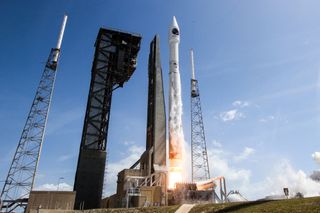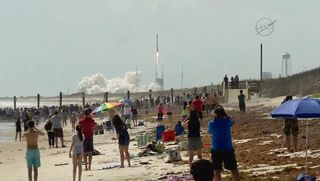Atlas V Rocket Launches Private Cygnus Cargo Ship to Space Station

CAPE CANAVERAL, Fla. — An Atlas V rocket boosted an Orbital ATK cargo ship into orbit this morning (April 18), setting the stage for the spacecraft's belated but welcome arrival at the International Space Station on Saturday.
The 191-foot (58-meter) Atlas V lifted off from Cape Canaveral Air Force Station in Florida at 11:11 a.m. EDT (1511 GMT), blazing through partly cloudy skies as it headed out over the Atlantic Ocean.
"It was a beautiful launch," said Vern Thorp, United Launch Alliance (ULA) commercial missions program manager. "It looks like we nailed the orbit once again." [Launch Photos: Orbital ATK's Cygnus Heads for Space]
The cargo launch had been planned for last month, but ULA, a partnership of Lockheed Martin and Boeing, delayed the mission due to an issue with the Atlas rocket's hydraulic system.
"We are sorry we missed Easter, but we're pretty sure they'll be excited about their Easter baskets and whatever great things International Space Station science put on board for them," said Frank Culbertson, president of Orbital's Space Systems Group.
The rocket carried a Cygnus cargo capsule loaded with more than 7,600 pounds (3,450 kilograms) of clothes, food, water, equipment and science experiments for the space station crew.
For the first time, NASA, in partnership with ULA and Orbital, broadcast a live, 360-degree view of the launch on YouTube.
Get the Space.com Newsletter
Breaking space news, the latest updates on rocket launches, skywatching events and more!

"This is not just for virtual reality viewers with 360 (degree) headsets, but anyone that's interested in gaining a panoramic view of the launch straight from their own smart device or personal computer," said launch commentator George Diller.
"You can manipulate the video on the screen, virtually placing you closer to a live rocket with a 360-degree view just a few feet away … as it's lifting off," Diller said.
Tuesday's launch was the seventh under Orbital's 10-flight contract with NASA that runs through 2018 and is worth up to $3.1 billion. The U.S. space agency also buys station resupply flights from Elon Musk's SpaceX, and in 2019 will begin using Sierra Nevada Corp’'s Dream Chaser space plane.
Orbital ATK's own midsize launch vehicle, Antares, returned to flight in October following an accident in 2014, but this time the company and NASA opted for a hired ride aboard ULA's beefier Atlas V, which can carry more cargo into orbit.
Orbital ATK previously bought two Atlas V rides to fill the gap while Antares was retrofitted with new engines.
Follow us @Spacedotcom, Facebook and Google+. Original article on Space.com.
Join our Space Forums to keep talking space on the latest missions, night sky and more! And if you have a news tip, correction or comment, let us know at: community@space.com.

Irene Klotz is a founding member and long-time contributor to Space.com. She concurrently spent 25 years as a wire service reporter and freelance writer, specializing in space exploration, planetary science, astronomy and the search for life beyond Earth. A graduate of Northwestern University, Irene currently serves as Space Editor for Aviation Week & Space Technology.
